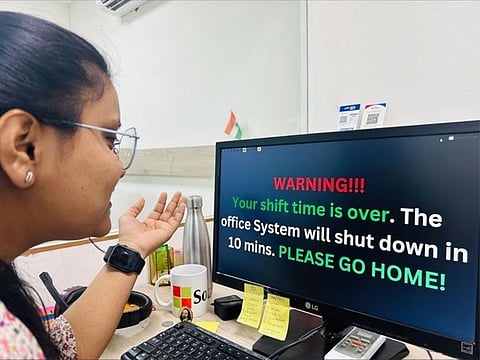'Shift time over, please go home': This company doesn't let employees work beyond their shift, LinkedIn post goes viral
LinkedIn user shares how her company shares a warning and locks desktop after work hours

Have you ever come across a company issuing a warning to remind employees to go home on time? A LinkedIn post that went viral this week showed how an Indian company issues a daily warning asking employees to log off their systems on time.
The post shared by LinkedIn user Tanvi Khandelwal, an HR Specialist, showed a photo of her office desktop screen, which read: “Warning! Your shift time is over. The office system will shut down in 10 minutes. PLEASE GO HOME.”
Noting that the company doesn’t let their employees work extra hours, Khandelwal mentioned that she and her colleagues don't need any special motivation to enjoy their workdays.
In the caption, she clarifies: “This is not a promotional and imaginary post. This is the reality of our office…. My employer supports #WorkLifeBalance. They put this special reminder, which locks my desktop after business hours and issues a warning.
“No more calls and emails outside of business hours. Isn't this fantastic? I think if you are working in this type of culture, you do not need any Monday Motivation or Fun Friday to improve your mood. Yes, in this era we believe in flexible working hours and a happy environment.”
Her post soon went viral with nearly half a million reactions. Thousands of people from different countries and work cultures began responding, starting a debate on whether this would be a practical solution to achieve work-life balance or not.
Many said this was a good initiative by the company.
“Brilliant,” wrote LinkedIn user Brian Klust. And, J'ezkella Afoakwah commented: “Wow... That's super impressive!”
However, many others felt such a measure would limit flexibility in workplaces.
Frances McAllister wrote: “That’s not really in the spirit of flexible working. That is enforced working hours and I would have a real problem with that, having worked in a truly flexible workplace. Appreciate the spirit of the gesture though.”
Another LinkedIn member, David Colclough wrote: “I don't know how to feel about this one. I like the idea, but not the implementation. I don't want to tell the folks I work with when they should come and go. If they are producing the result, they can come and go as needed. Come in early, leave early, stay late, leave, and return... It's for them to decide. They're adults, I want to treat them as such and be treated as such!"
Others pointed out the lack of practicality in such a system. User Dilip Nathani asked: “What if there is an escalation from the customer which requires an employee to work after shift?”
To which, another user, Shanta King replied: “Get somebody else to do it…”
User Aaron Graham added: “I would hate that. So many times, I might spend an additional 10 minutes just wrapping my projects up, saving etcetera, off the clock. It just puts my mind at ease. Otherwise, I would be constantly thinking of my work.” Such a system completely depends on the sector one works in, say UAE employees.
A Dubai-based CEO working in the oil and gas, and construction sectors, said: “This approach is never practical in the oil and gas sector. The schedules are always time-bound, and the requirements are more. An employee might want a system like this, but it won’t always be feasible for the employer.
“From an employee’s perspective in the construction industry, we work on a project basis, which has deadlines. To meet these, sometimes we have to work extra hours. Your work is based on achieving the milestones of the project. It would be great if those extra hours are compensated with some benefits,” he added.
Another Dubai-based sales director said: “Working hours completely depend on your field of specialisation. You could be working at a nine-to-five job with specific roles that do not require you to stay beyond working hours, for example, retail, or you could be working at a role that needs more flexible working conditions, such as project management. Nonetheless, being compensated for working hours beyond your official hours should be standard in the industry.”
A Dubai-based PR consultant said that she found the approach to be impractical for her line of work. She added: “My company is very vigilant with respecting employee timings by encouraging time management and healthy work-life balance. We also benefit from very flexible timings. In the case where we may need to access company resources for client needs, it is rare and manageable.”
However, a Sharjah-based employee and mum-of-two working at an insurance company said she would appreciate such an effort. “Some employers tend to exploit employees just because they know they depend on this monthly income. Our team manager demands that we be present in the office for a longer duration than we signed up for.
“While I understand that it is to achieve team targets and to fare better than other teams, sometimes it is unfair and unnecessary. I feel anxious when I give less time to my family. Sometimes it causes rifts between my partner and me, because he feels I am not available for the family. Team leaders should understand that work-life balance is important for sound mental health, which in turn makes you perform better at work. They should responsibly communicate the same to the higher management and employers. I would be happy if my company had such a system,” she added.
(Names of the UAE residents have been withheld upon request, for privacy.)
Sign up for the Daily Briefing
Get the latest news and updates straight to your inbox


